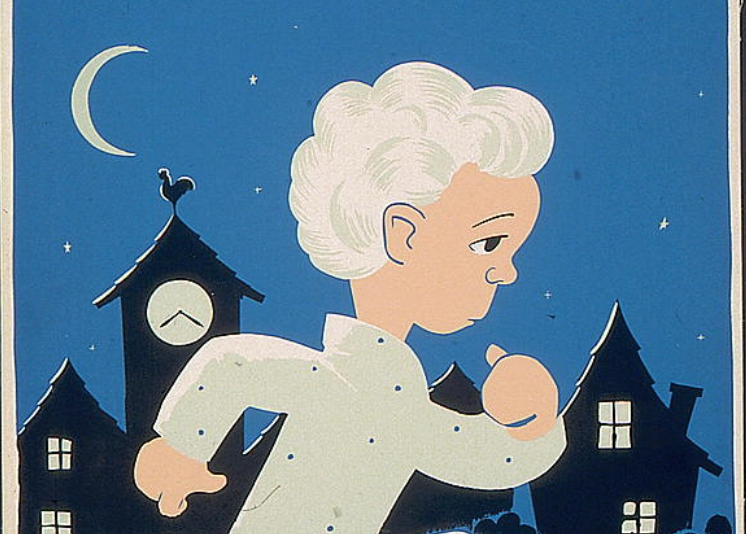This evening my wife and I were singing ‘Wee Willie Winkie’ to our two year old. It’s a lovely – if slightly creepy – nursery rhyme with a good tune and we were refreshing our memory of the words, dulled by rather too many years of adulthood, by looking at the text as printed in the Scottish Book Trust’s Bookbug Song and Rhyme Book. There it is given as:
Wee Willie Winkie,
Rins through the toun.
Up the stair, doon the stair,
In his night-goun.
Chappin at the windae,
Cryin at the lock.
‘Are the bairnies in their beds?
For noo it’s eight o’clock!’
Fair enough, you might say. But when the song was originally published in the third series of Whistle-Binkie; or, the Piper of the Party: Being a Collection of Songs for the Social Circle, Chiefly Original (Glasgow, 1842) it was subtly different. The version composed by its author, The Scots-speaking Glaswegian poet William Miller (1810-1872), reads as follows:
Wee Willie Winkie rins through the toon,
Up stairs an’ doon stairs in his nicht-gown,
Tirlin’ at the window, crying at the lock,
‘Are the weans in their bed, for it’s now ten o’clock?’
On the surface this might seem to be almost the same as the Bookbug version I was singing to my daughter earlier, but note two lexical differences: the replacement of ‘tirlin’ with ‘chappin’ and ‘weans’ with ‘bairnies’.
To chap, to knock or strike, is a word familiar to most residents of Scotland today, whether Scots-speakers or no. Not so, the less common ‘tirl’, to quiver, vibrate, or tremble. Wikipedia, that fount of all wisdom, suggests the original word choice relates to the early door bells known as ‘tirling pins’, but this seems unnecessary ingenuity. Surely it is simply a richly striking image of the sound and sensation of scratching at a windowpane?
The distinction between ‘wean’ and ‘bairn(ie)’ is subtler. ‘Wean’, to mean not just a recently weaned toddler but any child, is still used often enough by speakers of Scots but it is, perhaps, the rather less commonly heard of the two words. Certainly it doesn’t have the shibbolethic quality accorded to bairn or bairnie in much modern Scots-language material directed towards children (where it appears with every bit the same strident monotony as ‘peedie’ does in Orcadian advertising).
My point, then, is that these small shifts in word choice create an overall lexical impoverishment in the modern – as opposed to the 1842 – version of the rhyme. As with so much modern Scots, the vital distinctiveness of the language is replaced with phonetic spellings – to remind you that it is Scots, you know – and Anglicised vocabulary. Is that good enough? I would rather have Wee Willie Winkie tirl again.
(c) 2022 Kelsey Jackson Williams
The featured image is a detail from an American children’s library promotion poster of 1940 featuring Wee Willie Winkie.

Leave a comment